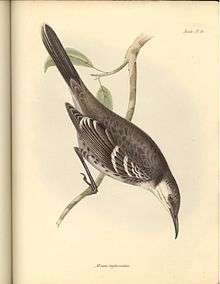Floreana mockingbird
The Floreana mockingbird (Mimus trifasciatus), or Charles mockingbird, is a species of bird in the family Mimidae.
| Floreana mockingbird | |
|---|---|
 | |
| Scientific classification | |
| Kingdom: | Animalia |
| Phylum: | Chordata |
| Class: | Aves |
| Order: | Passeriformes |
| Family: | Mimidae |
| Genus: | Mimus |
| Species: | M. trifasciatus |
| Binomial name | |
| Mimus trifasciatus (Gould, 1837) | |
| Synonyms | |
| |
It is endemic to Floreana, one of the Galápagos Islands; but human colonisation from 1832 onwards brought predators such as dogs and cats, and within 50 years the species was extinct on Floreana. It now occurs only on two inaccessible offshore islands, including Gardner.[2] Its natural habitat is subtropical or tropical dry shrubland. The Floreana mockingbird is also known as Darwin's mockingbird, as it was the arguable inspiration for Charles Darwin's work on the origins of species; he noticed distinct differences between them and previous species he had encountered and consequently established the existence of other variants on neighbouring islands.[3]
Previously classified as an endangered species by the IUCN, recent research shows that its numbers are decreasing more and more rapidly, and it is on the brink of extinction. It was consequently uplisted to critically endangered status in 2008, though it was downloaded back to endangered in 2017.[1]
Repopulation efforts
Today, two small sub-populations are extant on the small satellite islets of Champion and Gardner-by-Floreana.[4] They are due to be re-introduced as a third, possibly hybridized population on Floreana (due to genetic compatibility and hybrid viability revealed through analysis of the Darwin-Fitzroy collections).[4]
Footnotes
- BirdLife International. 2018. Mimus trifasciatus. The IUCN Red List of Threatened Species 2018: e.T22711063A132093428. https://dx.doi.org/10.2305/IUCN.UK.2018-2.RLTS.T22711063A132093428.en. Downloaded on 01 January 2019
- "The Natural World: Galápagos, Islands of Change". BBC Two. Retrieved 2015-09-24.
- "Darwin's mockingbirds knock finches off perch".
- "DNA clue to save rare Darwin bird". 2009-11-18.
References
- BirdLife International (BLI) (2008): [2008 IUCN Redlist status changes]. Retrieved 2008-MAY-23.
